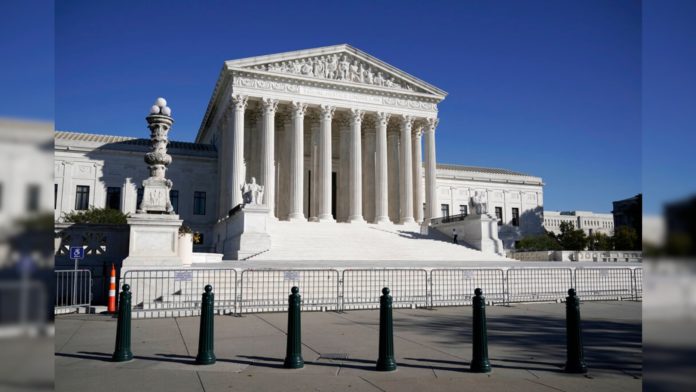

The latest Trump campaign appeal to the Supreme Court won’t see
any action from the justices until after the inauguration.
The justices this week set a reply deadline for Pennsylvania Secretary of State Kathy Boockvar and the other respondents named in the case of Jan. 22.
The campaign had asked for the Supreme Court to order those on the other side of the litigation to respond by Wednesday and have reply briefs from the Trump campaign submitted by Thursday. It also asked the court to rule by Jan. 6. But the court did not oblige.
This means that by the time Boockvar and the others the Trump campaign is seeking to take to the Supreme Court even respond to the petition, President-elect Joe Biden will already be sworn in.
At that point, the court could simply decline to hear the case, saying it is moot or impossible for them to resolve at that point. Congress will have already counted electoral votes and certified the next president — that meeting happens on Jan. 6. The Trump campaign, however, argued in its brief that even Inauguration Day would not make the court “moot” because such issues could happen in the future, and therefore the court should resolve them ahead of time.
The Trump campaign, in a statement over the weekend when it announced the petition, cited a statement from Justice Samuel Alito who cast doubt on whether it was constitutional for Pennsylvania to have its judicial branch make changes to laws governing the presidential election.
“This petition follows a related Pennsylvania case where Justice Alito and two other justices observed ‘the constitutionality of the [Pennsylvania] Supreme Court’s decision [extending the statutory deadline for receipt of mail ballots from 8 pm on election day to 5 pm three days later] … has national importance, and there is a strong likelihood that the State Supreme Court decision violates the Federal Constitution,'” Trump lawyer Rudy Giuliani said.
The Trump campaign did not reply to a request for comment on Thursday.
The Trump campaign is seeking to have the justices overturn three Pennsylvania Supreme Court decisions on signature verification, canvassing observation and specific requirements for how voters must fill in mail ballots.
“As described above, non-legislative officials, oftentimes at the instigation of partisan third parties, ignored or significantly altered and thereby violated state election law, including, most troublingly, laws enacted to minimize the risk of fraud in mail voting and thereby protect the integrity of the election process,” the Trump campaign lawsuit reads.
It continued: “The decisions of the Pennsylvania Supreme Court, an elected body, also raised serious concerns whether these were partisan attempts to assist the Democratic candidate whose campaign strategy of utilizing mail ballots was well publicized, in comparison to President’s Trump’s well-known strategy to encourage in-person voting.”
If the court were to rule in the Trump campaign’s favor, the petition specifically raised the possibility that Pennsylvania could re-certify its current results “if, and only if, they can establish the validity of a sufficient number of the mail ballots to sustain the existing certification.”
If that is not possible, the campaign said, the state legislature could step in.
The justices most recently dismissed a case brought by Texas asking for the court to essentially nullify the presidential election results in Pennsylvania, Michigan, Georgia and Wisconsin. It took the justices mere hours after Texas submitted its final brief decline to hear the case for lack of standing.
Many other challenges by the Trump campaign and its allies, alleging widespread election fraud, have failed in a variety of state and federal courts. The pre-election challenge to Pennsylvania’s mail ballot deadline extension — which elicited the statement from Alito that was also signed by Justices Gorsuch and Thomas — was the case that appeared to gain the most traction in its argument.
Biden beat Trump by more than 80,000 votes in Pennsylvania and by thousands in other key states that put him over the top in the electoral college.
Nevertheless, the Trump campaign continues its litigation. Trump himself this week continued to assert that he won the election by a “magnificent landslide.”
Trump has also supported an effort by some GOP House members, let by Rep. Mo Brooks, R-Ala., to object to the Electoral College slates of some states Biden won, in a last-ditch effort to overturn the election results. But that effort is highly unlikely to succeed.
The House members would need a senator to join their request to force each chamber to vote on whether to reject any individual state’s electoral votes. If that happens, it is almost certain that neither the House nor the Senate would reject the votes — and both would need to do so in order for a challenge to succeed. Even in the GOP-controlled Senate, many Republicans have already congratulated Biden on his victory, including Senate Majority Leader Mitch McConnell, R-Ky.
When asked about his thoughts on a potential Electoral College challenge during the Jan. 6 joint session, Senator John Thune, R-S.D., said such an effort would be “going down like a shot dog.”
(Fox News).





